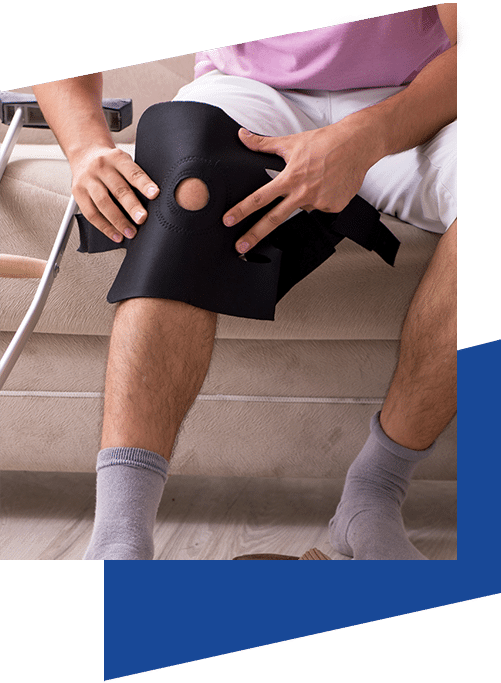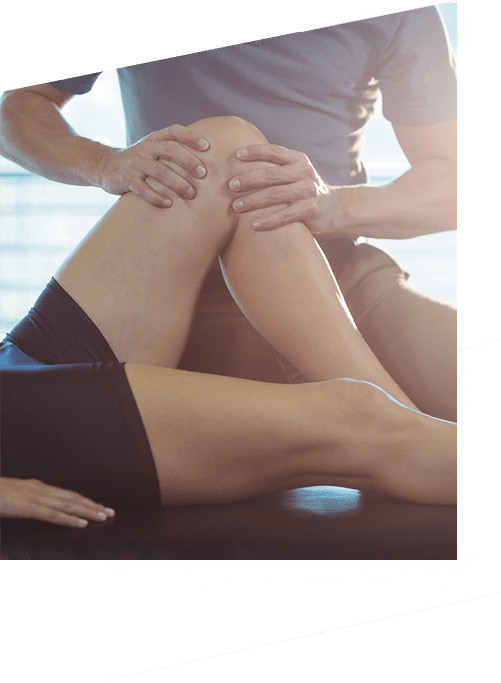Did you know that post-surgery rehabilitation is a vital step towards achieving a successful recovery after a surgical procedure?
Whether you’ve undergone joint surgery, spinal surgery, or any other surgical intervention, the right rehabilitation can make a significant difference in your healing journey.
At Infinity Allied Healthcare, we are dedicated to providing comprehensive post-surgery rehabilitation services to help you regain your mobility and get back to living life to the fullest.
Contact us to book your consultation or book online.
Advanced Physiotherapy Advanced and modern manual therapy and hands on techniques. |

1 on 1 |

Quick |
Highest Standard |
What is post-surgery rehabilitation?

Post-surgery rehabilitation is a specialised form of physiotherapy that focuses on restoring functionality, strength, and mobility after a surgical procedure.
It is a crucial aspect of the recovery process, designed to address the unique needs of each patient and ensure a smooth transition from post-operative care to resuming daily activities.
Why you need post-operative rehabilitation
Post-operative rehabilitation is essential for several reasons. It helps reduce pain and inflammation, prevents complications, improves muscle strength, and enhances joint flexibility.
It also plays a significant role in restoring your independence, allowing you to return to work, sports, and daily activities with confidence.
Types of surgery that require rehab
Various types of surgery may require post-surgery rehabilitation to aid in the recovery process. Some common types of surgery that often necessitate rehabilitation include:
- Joint Replacement Surgery: Procedures such as hip replacement, knee replacement, or shoulder replacement often require post-surgery rehabilitation to regain mobility, strength, and flexibility in the affected joint.
- Spinal Surgery: Surgeries performed on the spine, including spinal fusion, laminectomy, or discectomy, may require rehabilitation to improve back strength, posture, and overall function.
- Orthopaedic Surgeries: Various orthopaedic procedures, such as ligament repairs, tendon repairs, or fracture fixations, often require rehabilitation to regain optimal functionality and prevent complications.
- Cardiac Surgery: Cardiac procedures like coronary artery bypass grafting (CABG) or heart valve surgeries may necessitate rehabilitation to enhance cardiovascular health and promote recovery.
- Neurological Surgeries: Surgeries performed on the brain or nervous system, such as brain surgery, brain tumour removal or stroke interventions, may require rehabilitation to restore motor skills and cognitive function.
- Abdominal Surgeries: Procedures like abdominal hernia repair or gastrointestinal surgeries may need rehabilitation to improve core strength and functional abilities.
- Cancer Surgeries: Surgeries performed as part of cancer treatment, such as mastectomy or lymph node removal, may require rehabilitation to aid in healing and restore physical function.
- Organ Transplant Surgeries: After receiving a new organ, patients may need rehabilitation to regain strength and adjust to the changes in their bodies.
- Cardiopulmonary Surgeries: Procedures like lung resection or lung transplant may require rehabilitation to optimise respiratory function and endurance.
Inpatient rehab vs. outpatient rehab
Depending on your surgery and individual circumstances, post-surgery rehabilitation can be conducted through inpatient or outpatient programs.
Inpatient rehab involves staying at a dedicated facility, where our expert medical professionals closely monitor your progress.
Outpatient rehab allows you to attend therapy sessions at our state-of-the-art clinic while living at home. Our experienced team will assess your condition and recommend the most suitable option for your recovery journey.
Benefits of post-surgery treatment
Some key advantages of post-surgery treatment include:
- Faster Recovery: Post-surgery treatment is designed to accelerate the recovery process. It helps reduce healing time, allowing patients to return to their daily activities sooner.
- Pain Management: Post-operative pain is a common concern for surgical patients. Rehabilitation includes various techniques and therapies to manage pain effectively, reducing the need for strong pain medications.

- Improved Mobility and Functionality: Post-surgery treatment focuses on restoring mobility, strength, and flexibility. Patients experience improved joint function and movement, enabling them to perform everyday tasks with greater ease.
- Prevention of Complications: Rehabilitation helps prevent post-surgical complications, such as blood clots, muscle weakness, and joint stiffness. It reduces the risk of secondary issues that could hinder the healing process.
- Strengthening Muscles and Joints: Physiotherapy exercises and techniques target specific muscle groups and joints, aiding in their strengthening and stabilisation. This is particularly important after orthopaedic surgeries or joint replacements.
- Restoration of functional Independence: Post-surgery treatment aims to restore independence and self-sufficiency. Patients regain the ability to care for themselves and resume activities they enjoyed before the surgery.
- Customised Treatment Plans: Each patient receives personalised rehabilitation plans tailored to their specific surgical procedure, medical history, and individual goals.
- Enhanced Psychological Well-Being: Recovering from surgery can be challenging both physically and emotionally. Rehabilitation provides a supportive environment, boosting patients’ confidence and mental well-being.
- Education and Lifestyle Advice: Post-surgery treatment involves educating patients about their condition, proper body mechanics, and exercises they can do at home. This empowers patients to actively participate in their recovery and prevent future injuries.
- Injury Prevention: By addressing biomechanical imbalances and weaknesses, post-surgery treatment helps reduce the risk of re-injury and promotes long-term health and wellness.
- Supportive Environment: Rehabilitation centres offer a supportive and encouraging environment where patients can interact with healthcare professionals and fellow patients who understand their journey.
Post-surgery rehab treatment types
Post-surgery rehabilitation for optimal recovery involves a variety of treatment types and techniques to aid in the recovery process and support patients in regaining their functionality and mobility:
- Therapeutic Exercises: Therapeutic exercises play a central role in post-surgery rehabilitation. These specific exercises are designed to strengthen muscles, improve joint flexibility, and enhance overall physical function. Depending on the surgery and the affected area, exercises may include a range of motion exercises, strengthening exercises, and functional movements.
- Manual Therapy: Manual therapy techniques involve hands-on manipulation by skilled physiotherapists to mobilize soft tissues and joints. Manual therapy helps reduce pain, increase joint range of motion, and improve tissue healing.
- Electrical Stimulation: Electrical stimulation, such as transcutaneous electrical nerve stimulation (TENS) or neuromuscular electrical stimulation (NMES), is used to alleviate pain, reduce muscle spasms, and improve muscle strength.
- Heat and Cold Therapy: Heat therapy (e.g., warm packs) and cold therapy (e.g., ice packs) are used to manage pain, reduce inflammation, and promote tissue healing.
- Assistive Devices: After surgery, patients may require assistive devices such as crutches, canes, or walkers to aid mobility during the recovery phase. Physiotherapists assist in proper usage and provide guidance on gradually reducing reliance on these devices as the patient’s strength improves.
- Pain Management Strategies: Apart from physical therapies, physiotherapists may provide education on pain management techniques, including relaxation techniques and proper body positioning.
Cost of post-surgery treatment
The cost of post-surgery treatment and a rehab program can vary depending on factors such as the type of treatment, duration and severity of the condition
Expenses may include medical consultations, diagnostic tests physical therapy interventions.
It’s advisable to contact us for more information on pricing and medical insurance rebates.
Contact us to book your consultation or book online.
Choose Infinity Allied Healthcare for Your Post-Surgery
When it comes to post-surgery rehabilitation programs, Infinity Allied Healthcare is the leading physiotherapy centre in Sydney. Our multidisciplinary team of physiotherapists is dedicated to providing personalised care and support throughout your recovery journey.
We are committed to helping you regain your strength, mobility, and independence, allowing you to return to your everyday activities with confidence.
Contact us to book your consultation or book online and take the first step towards finding relief.
Frequently Asked Questions
When should I start post-surgery rehabilitation?
Post-surgery rehabilitation should ideally begin as soon as your physician approves. Starting early can enhance your recovery process and improve outcomes.
How long will my post-surgery rehab last?
The duration of post-surgery rehabilitation varies depending on the type of surgery and individual factors. A physical therapist will develop a customised treatment plan and keep you informed about the expected timeline.
Is post-surgery rehabilitation painful?
Our team of health professionals will design a treatment plan to minimise discomfort while maximising effectiveness. The focus is on aiding your recovery in a gentle and supportive manner.
How will post-surgery physiotherapy aid the rehabilitation process and improve my life?
Post-surgery rehabilitation aims to restore your physical function, reduce pain, and improve your overall quality of life. With improved mobility and strength, you’ll be better equipped to resume your daily activities and lead an active lifestyle.
Please note that this information is not intended to be used for diagnosis or treatment. It is aimed at presenting a perspective only and is not a substitute for a prescription. Anyone experiencing a medical condition or requiring medical therapy should consult their doctor. A second opinion is also encouraged.


